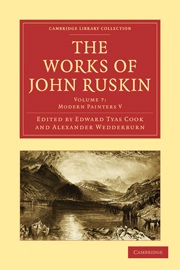Book contents
- Frontmatter
- Contents
- LIST OF ILLUSTRATIONS
- INTRODUCTION TO THIS VOLUME
- BIBLIOGRAPHICAL NOTE
- Modern Painters, Vol. V.
- PREFACE
- PART VI “OF LEAF BEAUTY”
- PART VII “OF CLOUD BEAUTY”
- PART VIII “OF IDEAS OF RELATION:—FIRST, OF INVENTION FORMAL”
- CHAP. I THE LAW OF HELP
- CHAP. II THE TASK OF THE LEAST
- CHAP. III THE RULE OF THE GREATEST
- CHAP. IV THE LAW OF PERFECTNESS
- PART IX “OF IDEAS OF RELATION:—SECOND, OF INVENTION SPIRITUAL”
- EPILOGUE (1888)
- APPENDIX
- Plate section
CHAP. III - THE RULE OF THE GREATEST
Published online by Cambridge University Press: 07 September 2011
- Frontmatter
- Contents
- LIST OF ILLUSTRATIONS
- INTRODUCTION TO THIS VOLUME
- BIBLIOGRAPHICAL NOTE
- Modern Painters, Vol. V.
- PREFACE
- PART VI “OF LEAF BEAUTY”
- PART VII “OF CLOUD BEAUTY”
- PART VIII “OF IDEAS OF RELATION:—FIRST, OF INVENTION FORMAL”
- CHAP. I THE LAW OF HELP
- CHAP. II THE TASK OF THE LEAST
- CHAP. III THE RULE OF THE GREATEST
- CHAP. IV THE LAW OF PERFECTNESS
- PART IX “OF IDEAS OF RELATION:—SECOND, OF INVENTION SPIRITUAL”
- EPILOGUE (1888)
- APPENDIX
- Plate section
Summary
§ 1. In the entire range of art principles, none perhaps present a difficulty so great to the student, or require from the teacher expression so cautious, and yet so strong, as those which concern the nature and influence of magnitude.
In one sense, and that deep, there is no such thing as magnitude. The least thing is as the greatest, and one day as a thousand years, in the eyes of the Maker of great and small things. In another sense, and that close to us and necessary, there exist both magnitude and value. Though not a sparrow falls to the ground unnoted, there are yet creatures who are of more value than many; and the same Spirit which weighs the dust of the earth in a balance, counts the isles as a little thing.
§ 2. The just temper of human mind in this matter may, nevertheless, be told shortly. Greatness can only be rightly estimated when minuteness is justly reverenced. Greatness is the aggregation of minuteness; nor can its sublimity be felt truthfully by any mind unaccustomed to the affectionate watching of what is least.
But if this affection for the least be unaccompanied by the powers of comparison and reflection; if it be intemperate in its thirst, restless in curiosity, and incapable of the patient and self-commandant pause which is wise to arrange, and submissive to refuse, it will close the paths of noble art to the student as effectually, and hopelessly, as even the blindness of pride, or impatience of ambition.
- Type
- Chapter
- Information
- The Works of John Ruskin , pp. 230 - 235Publisher: Cambridge University PressPrint publication year: 2010First published in: 1903



